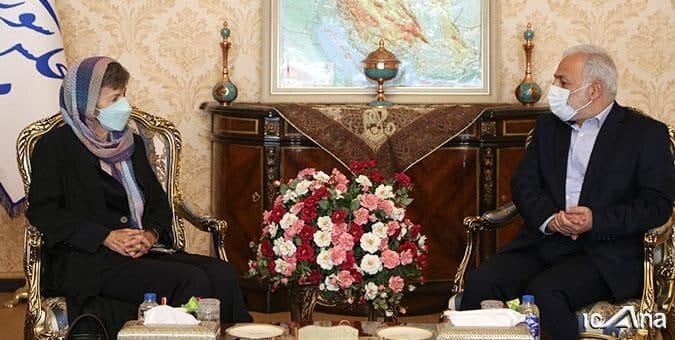Iran-Australia parliamentary co-op is prelude to strengthening diplomatic ties: MP

TEHRAN - The head of the National Security and Foreign Policy Committee of the Iranian Parliament has said that no country can ignore the effective role of the Islamic Republic of Iran in the fight against terrorism in the region, the IRIB reported on Friday.
Vahid Jalalzadeh made the remarks in a meeting with Lyndall Sachs, the Australian Ambassador to Tehran.
At the beginning of the meeting, Jalalzadeh referred to the decades-long history of Australia's relations with Iran and said: "The history of half a century of relations between the two countries shows the existence of many economic and political interests between the two countries."
The MP noted that relations between the two countries have been going through ups and downs due to global developments including the oppressive U.S. sanctions against Iran.
The Majlis committee chief said the parliamentary cooperation between Iran and Australia is a prelude to strengthening diplomatic and government-to-government interactions.
"Strengthening parliamentary relations by specialized committees and parliamentary friendship groups… will contribute to the development of political, economic and cultural relations between the two sides."
Elsewhere in his remarks, the senior parliamentarian referred to regional developments and the advisory assistance of Iran to Iraq and Syria in their fight against terrorism, underscoring: "The policy of the Islamic Republic of Iran is to restore stability and peace in the region and welcomes any measure in this regard."
"No country can ignore the effective role of the Islamic Republic of Iran in the fight against terrorism in the region," Jalalzadeh stressed.
The MP was referring to Iran’s help to Iraq and Syria in their campaign against terrorist groups including Daesh.
“Iran seeking inclusive government in Afghanistan”
The senior lawmaker also discussed developments in Afghanistan with the Australian ambassador in Tehran.
"Regarding the issue of Afghanistan, Iran's principled position is formation of an inclusive government with the involvement of all ethnic groups in Afghanistan without violence against women and children," the MP pointed out.
Iran has been pushing for an inclusive government in Afghanistan and it is going to host a conference of the countries neighboring Afghanistan.
Jalalzadeh also expressed dissatisfaction with the presence and intervention of foreign countries in the region, noting the countries of the region have reached that degree of political maturity to resolve issues between themselves.
He said the U.S. presence in Iraq and Afghanistan “has led to the continuation of the crisis and lack of peace in these two countries."
The U.S. left Afghanistan in late August in a way that looked like escape from Vietnam in the 1975. The U.S. exit in Afghanistan left its regional and European allies in disarray.
The MP also lamented the violation of the 2015 nuclear deal by U.S., reiterating Tehran’s position that a possible return of the U.S. to the multilateral deal, officially called the Joint Comprehensive Plan of Action, must be verified in a concrete way.
"A U.S. return to the JCPOA needs to be verified and lifting of U.S. sanctions will be the first step for the Islamic Republic of Iran to return to its obligations to the deal," the MP asserted.
Six rounds of talks in Vienna between Iran and the remaining nuclear deal parties – three European countries of Britain, France, and Germany plus China and Russia - failed to bear fruit as the U.S., which was participating in the talks indirectly, raised new issues not related to the original JCPOA. Such an approach has forced officials in Tehran to say that the Joe Biden administration if following the Trump policies toward Iran.
The MP said European countries and Australia cooperated with the U.S. in its illegal sanctions policy against Iran to the detriment of their economies, stressing these countries should keep their independence from the wrong, irrational and unilateral U.S. policies.
Two senior political analysts have called on the Biden administration to separate talks on a revival of the 2015 nuclear deal with Iran from security issues in West Asia.
In an article in Foreign Policy published recently, Professor Vali Nasr from Johns Hopkins University’s School of Advanced International Studies and Hossein Mousavian, a West Asia security and nuclear policy specialist at Princeton University, warned that insisting on a package deal could permanently derail nuclear talks, warned.
U.S. allies in West Asia have already taken the initiative on regional issues, the two analysts wrote.
Fareed Zakaria, a Washington Post columnist, has also recently expressed surprise at Biden normalizing Trump’s foreign policy in many areas, including the 2015 nuclear deal.
“Australia wants to increase economic cooperation with Iran”
Ambassador Sachs, for her part, underlined the history of relations between the two countries sand said: "Australia seeks to strengthen relations and cooperation in various fields with the Islamic Republic of Iran."
The top diplomat pointed to the effective role of parliamentary cooperation in enhancing the level of interaction between the two countries.
"Parliamentary relations and cooperation between the Australian and Iranian joint committees are important in strengthening cooperation, and Australia has always considered it as important to pay attention to parliamentary relations," Sachs remarked.
Highlighting the importance of strengthening interactions and investment by private sectors, the ambassador added: "Australia wants to increase the level of economic cooperation with the Islamic Republic of Iran."
At the end of the meeting, the Australian ambassador called for strengthening political and cultural ties with Iran and expressed hope that by lifting U.S. sanctions against Iran, Australia would expand its economic relations with Iran.
